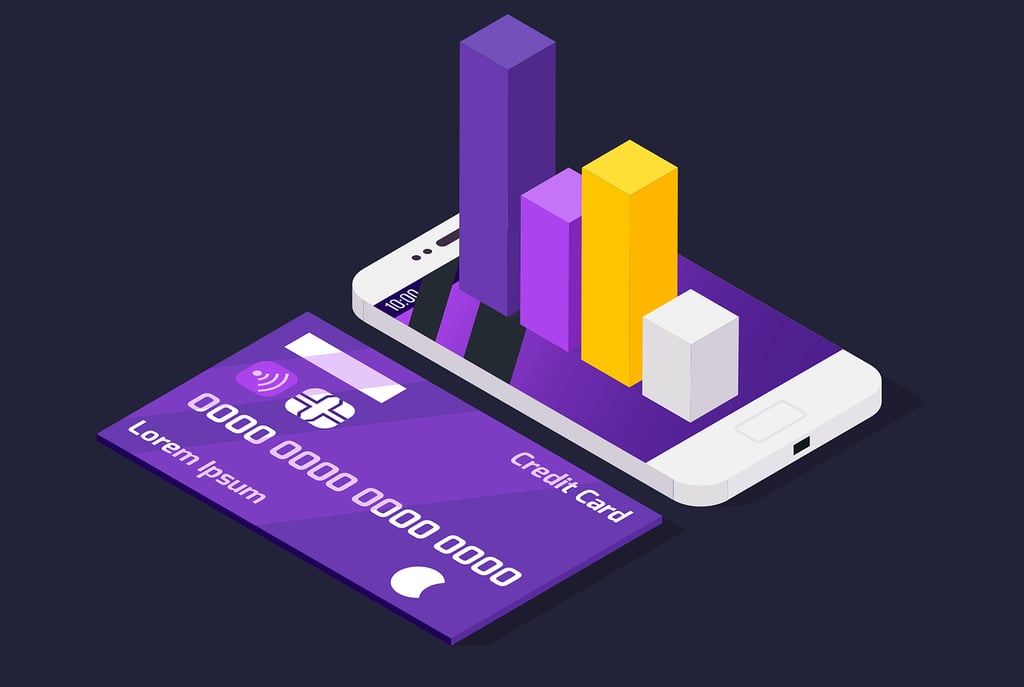The Beginner’s Guide to Building Credit: 14 Proven Strategies for a Strong Financial Foundation
CREDIT CARDSGUIDES
2/18/20255 min read


Building a solid credit foundation is essential for financial stability and access to favorable lending terms. For beginners, understanding the steps to establish and improve credit can seem daunting, but with informed strategies, it's entirely achievable. In this comprehensive guide, we’ll walk you through everything you need to know to build and maintain a strong credit profile. From understanding the importance of credit to actionable tips for improving your score, this article is your one-stop resource for mastering credit management.
1. Understand the Importance of Credit
Credit is more than just a number—it’s a reflection of your financial trustworthiness. A good credit history can influence your ability to rent an apartment, secure loans, or even land certain jobs. Lenders, landlords, and employers often use your credit score to assess your reliability and risk level.
A strong credit profile can unlock opportunities like lower interest rates on loans, higher credit limits, and better terms on mortgages. On the other hand, poor credit can lead to higher interest rates, loan denials, and limited financial options. Understanding the importance of credit is the first step toward taking control of your financial future.
2. Start with a Secured Credit Card
If you’re new to credit or have a limited credit history, a secured credit card is an excellent starting point. Unlike traditional credit cards, secured cards require a cash deposit, which serves as collateral and typically sets your credit limit. For example, if you deposit $500, your credit limit will usually be $500.
Using a secured credit card responsibly—by making small purchases and paying off the balance in full each month—can help you build a positive credit history. Over time, your responsible usage will be reported to credit bureaus, gradually improving your credit score. Many secured card issuers also offer the opportunity to upgrade to an unsecured card after demonstrating consistent, responsible use.
3. Consider a Credit-Builder Loan
Credit-builder loans are specifically designed to help individuals establish or rebuild credit. These loans work differently from traditional loans. Instead of receiving the loan amount upfront, the funds are held in a bank account while you make monthly payments. Once the loan is paid off, the funds are released to you, and your payment history is reported to credit bureaus.
This type of loan is ideal for beginners because it minimizes risk for lenders while providing you with a structured way to build credit. Credit-builder loans are often offered by credit unions and community banks, so be sure to explore local options.
4. Become an Authorized User
If you have a family member or friend with a strong credit history, consider asking them to add you as an authorized user on their credit card. As an authorized user, their positive payment history will be reflected on your credit report, potentially boosting your credit score.
However, this strategy comes with a caveat: if the primary cardholder misses payments or carries a high balance, it could negatively impact your credit. Therefore, it’s crucial to ensure that the primary cardholder maintains good credit habits before becoming an authorized user.
5. Pay All Bills on Time
Your payment history is the most significant factor in determining your credit score, accounting for 35% of your FICO score. Consistently paying bills on time—whether it’s credit card bills, rent, utilities, or student loans—demonstrates financial responsibility and builds trust with lenders.
To avoid missed payments, set up automatic payments or reminders. Some services, like Experian Boost, even allow you to add utility and phone bill payments to your credit report, further enhancing your credit profile.
6. Keep Credit Utilization Low
Credit utilization refers to the percentage of your available credit that you’re using. For example, if your credit limit is 1,000andyouhavea1,000andyouhavea300 balance, your credit utilization is 30%. It’s generally recommended to keep your utilization below 30%, but aiming for 10% or lower is even better.
High credit utilization can signal to lenders that you’re over-reliant on credit, which can negatively impact your score. To keep your utilization low, pay off your balances in full each month and avoid maxing out your credit cards.
7. Monitor Your Credit Regularly
Regularly reviewing your credit report is essential for tracking your progress and identifying any errors or fraudulent activities. You’re entitled to a free credit report annually from each of the three major credit bureaus—Equifax, Experian, and TransUnion—through AnnualCreditReport.com.
If you spot any inaccuracies, such as incorrect account information or unauthorized inquiries, dispute them promptly with the credit bureau. Maintaining an accurate credit profile is crucial for achieving and maintaining a good credit score.
8. Avoid Opening Multiple Accounts Quickly
While it might be tempting to open several credit accounts to build credit, doing so in a short period can lower your credit score. Each time you apply for credit, a hard inquiry is placed on your credit report, which can temporarily ding your score. Additionally, opening multiple accounts can reduce the average age of your credit history, another factor that influences your score.
Instead, focus on building credit gradually by responsibly managing a few accounts over time. Patience and consistency are key to long-term credit success.
9. Diversify Your Credit Mix
Having a diverse mix of credit accounts—such as credit cards, installment loans, and mortgages—can positively impact your credit score. Lenders like to see that you can manage different types of credit responsibly. However, this doesn’t mean you should take on debt unnecessarily. Only pursue credit accounts that align with your financial goals and needs.
10. Be Patient and Persistent
Building credit is a marathon, not a sprint. It takes time to establish a solid credit history and see significant improvements in your score. Stay committed to responsible credit habits, such as paying bills on time, keeping balances low, and monitoring your credit regularly. Over time, your efforts will pay off, and you’ll enjoy the benefits of a strong credit profile.
11. Leverage Tools and Resources
There are numerous tools and resources available to help you build and manage your credit. For example:
Credit Monitoring Services: Platforms like Credit Karma , TransUnion and Experian provide free credit monitoring and alerts.
Budgeting Apps: Apps like Mint and Quicken can help you track spending and manage payments.
Financial Education: Websites like NerdWallet and Bankrate and of course The Smart Money Guide offer valuable tips and guides on credit management.
12. Avoid Common Credit Mistakes
As you work on building your credit, be mindful of common pitfalls that can derail your progress:
Missing Payments: Even one late payment can significantly impact your credit score.
Closing Old Accounts: Closing old credit accounts can shorten your credit history and increase your credit utilization ratio.
Applying for Too Much Credit: Multiple credit applications in a short period can lower your score and signal financial distress to lenders.
13. Plan for the Future
Once you’ve established a solid credit foundation, focus on maintaining and improving your score. Continue practicing good credit habits, and explore opportunities to further enhance your financial health. For example, consider applying for a rewards credit card or refinancing high-interest loans to save money.
14. The Long-Term Benefits of Good Credit
A strong credit profile opens doors to numerous financial opportunities, including:
Lower interest rates on loans and credit cards
Higher credit limits
Better terms on mortgages and auto loans
Increased chances of approval for rental applications and job opportunities
By investing time and effort into building your credit, you’re setting yourself up for long-term financial success.
Final Thoughts
Building a solid credit foundation is a journey that requires knowledge, discipline, and patience. By following the steps outlined in this guide—starting with a secured credit card, paying bills on time, keeping credit utilization low, and monitoring your credit regularly—you can establish and maintain a strong credit profile. Remember, good credit is not just a number; it’s a tool that can help you achieve your financial goals and secure a brighter future.
By incorporating these tips into your financial routine, you’ll not only boost your credit score but also gain the confidence and knowledge to navigate the world of credit with ease. Happy credit building!
Start today, and take control of your credit journey. Your future self will thank you!
Connect
Join our community for financial insights and helpful tips.
Newsletter
© 2024. All rights reserved.
Get the latest financial tips and insights.
